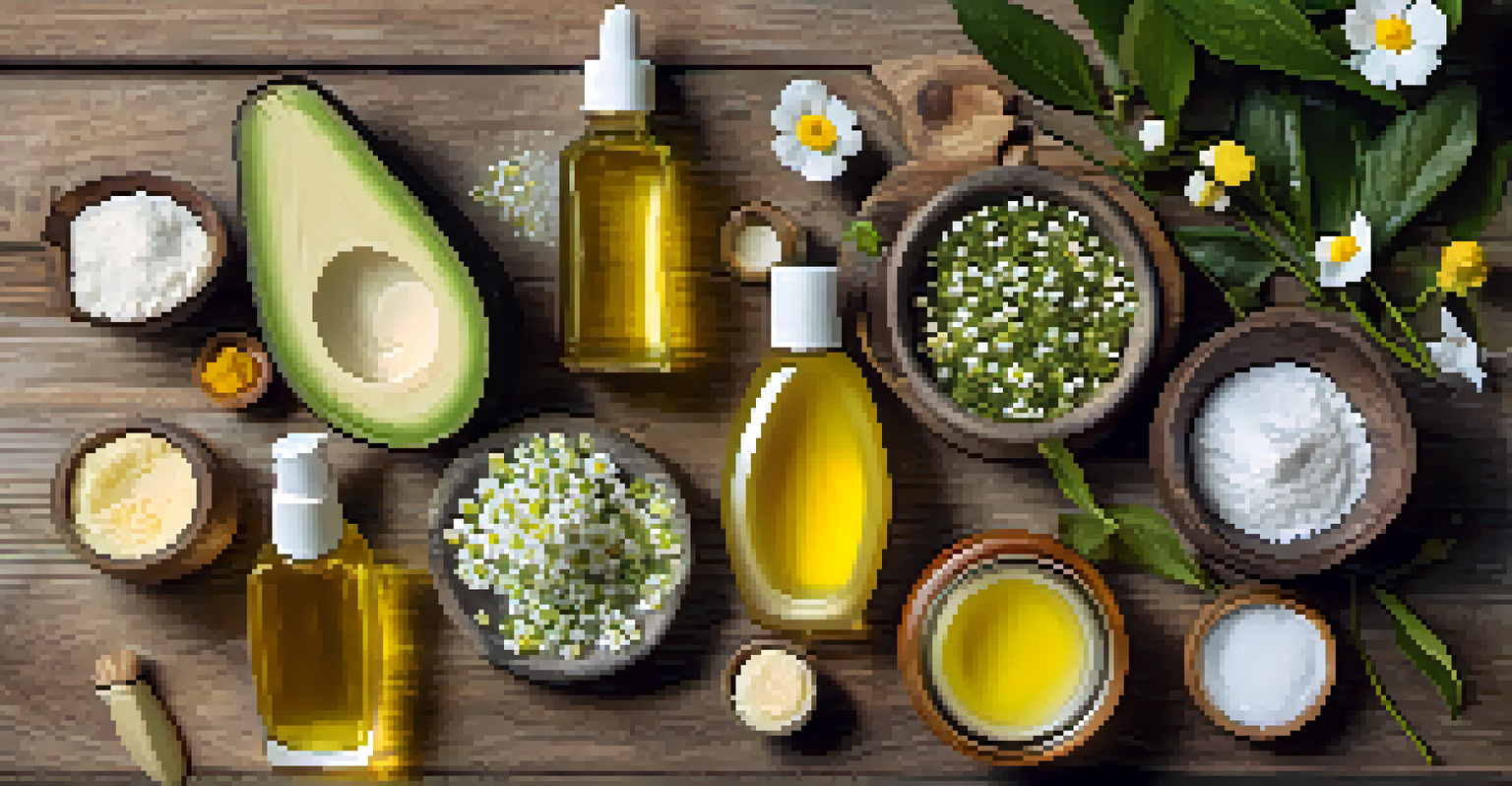How Plant-Based Ingredients Benefit Different Skin Types

Understanding Plant-Based Ingredients and Their Power
Plant-based ingredients are derived from natural sources like fruits, vegetables, and herbs, making them a popular choice in skincare. They are rich in vitamins, antioxidants, and essential fatty acids that can nourish the skin. By using these ingredients, we can tap into nature's wisdom to address various skin concerns effectively.
Nature itself is the best physician.
For instance, aloe vera is celebrated for its soothing properties, making it perfect for sensitive skin. On the other hand, oils like jojoba and coconut are fantastic for hydration, catering to dry skin types. The beauty of plant-based ingredients lies in their versatility, as they can cater to a wide array of skin needs.
Moreover, these ingredients often come with fewer harsh chemicals compared to traditional skincare products. This not only benefits your skin but also aligns with a more sustainable lifestyle, appealing to those who prioritize eco-friendliness in their beauty routines.
Benefits for Oily Skin: Balancing Act with Nature
Oily skin can be a challenge, often leading to breakouts and enlarged pores. Fortunately, plant-based ingredients like tea tree oil and witch hazel can help manage excess oil production. These natural astringents work by tightening pores and reducing shine without stripping the skin of its natural moisture.

Additionally, ingredients like neem and willow bark have antibacterial properties that can combat acne-causing bacteria. They help clear blemishes and prevent future breakouts, giving you clearer skin without harsh chemicals. It's like having a natural defense team working tirelessly to keep your skin balanced.
Plant-Powered Skincare Benefits
Plant-based ingredients provide essential nutrients that address various skin concerns effectively.
Using lightweight plant oils, such as grapeseed or hemp oil, can also provide hydration without the heaviness that often aggravates oily skin. These oils are non-comedogenic, meaning they won’t clog pores, allowing your skin to breathe while staying moisturized.
Dry Skin Solutions: Hydration from Nature’s Pantry
Dry skin can often feel tight and uncomfortable, but plant-based ingredients offer a plethora of solutions. Ingredients rich in fatty acids, like avocado oil and shea butter, are excellent for deeply moisturizing and nourishing the skin. They help restore the skin barrier, locking in moisture and keeping your skin soft and supple.
The greatest wealth is health.
Moreover, botanical extracts like chamomile and calendula have anti-inflammatory properties that soothe irritation and redness. They work wonders for sensitive dry skin, calming any flare-ups and promoting a healthier complexion. It's like a gentle hug for your skin, wrapping it in comfort.
Incorporating plant-based serums or creams into your skincare routine can make a significant difference. With consistent use, you'll notice a transformation in your skin’s texture and overall hydration levels, making dry skin a thing of the past.
Sensitive Skin: Gentle Remedies from Plants
For those with sensitive skin, finding the right products can be a daunting task. Plant-based ingredients like aloe vera, chamomile, and cucumber are known for their calming effects. They help reduce redness and irritation, making them ideal for soothing sensitive skin.
Additionally, oat extract is another fantastic ingredient that provides relief from itching and inflammation. This makes it a great choice for individuals dealing with conditions like eczema or rosacea. It’s like nature’s remedy, providing comfort when your skin needs it the most.
Tailored Solutions for Skin Types
Different plant-based ingredients can be utilized to cater to specific skin types, from oily to dry.
When looking for products, always opt for those with minimal additives and a focus on natural ingredients. This ensures your skin receives the gentle care it deserves, free from harsh chemicals that could exacerbate sensitivity.
Combination Skin: Finding Balance with Plant-Based Ingredients
Combination skin presents its own unique challenges, often requiring a tailored approach. Plant-based ingredients can help balance the different needs of various areas on your face. For instance, using a lightweight gel with cucumber for oily areas can hydrate without adding excess oil.
Meanwhile, richer ingredients like argan oil can be applied to drier patches, ensuring your skin maintains a healthy glow. This targeted approach allows you to cater to both oily and dry zones effectively, achieving harmony in your skincare routine.
Moreover, products containing natural exfoliants like fruit acids can help remove dead skin cells without being overly abrasive. This promotes a smoother texture while preventing clogged pores, striking the perfect balance for combination skin.
Anti-Aging Benefits: Nature’s Fountain of Youth
As we age, our skin requires extra care and nourishment, and plant-based ingredients can play a vital role in this process. Ingredients like rosehip oil and pomegranate extract are packed with antioxidants that protect against free radicals, which can accelerate aging. Regular use can help maintain skin elasticity and reduce the appearance of fine lines.
Furthermore, botanical extracts such as green tea are known for their anti-inflammatory properties, promoting a youthful and radiant complexion. They help combat puffiness and dark circles, making you look refreshed and vibrant, even on the busiest days.
Importance of Patch Testing
Conducting a patch test before using new products is crucial to avoid potential allergic reactions.
Incorporating these plant-based ingredients into your skincare routine can be a game-changer. With consistent care, you’ll not only enhance your skin's appearance but also embrace the natural aging process gracefully.
The Importance of Patch Testing Plant-Based Products
Even though plant-based ingredients are generally gentler on the skin, it’s crucial to conduct a patch test before fully incorporating a new product. This step helps identify any potential allergic reactions or sensitivities you may have. Simply apply a small amount to a discreet area and wait 24 hours to see how your skin reacts.
This precaution is especially important for those with sensitive skin or allergies. Even natural ingredients can sometimes trigger reactions, so being cautious is key. It’s like dipping your toes in the water before diving in, ensuring a safe and pleasant experience.

If all goes well after the patch test, you can confidently add the product to your daily routine. This small step can save you from potential irritations and ensure that your skin receives the love it deserves.
Choosing the Right Products: A Guide to Ingredients
When selecting plant-based skincare products, it's essential to read the ingredient list carefully. Look for formulations that prioritize natural ingredients and avoid those with excessive fillers or synthetic additives. This ensures you get the full benefits of the plant extracts without unnecessary complications.
Additionally, consider your skin type and specific concerns. For instance, if you have oily skin, seek out products with ingredients like salicylic acid derived from willow bark. For dry skin, prioritize nourishing oils like olive or almond oil to provide the hydration your skin craves.
Lastly, don’t hesitate to consult with a skincare professional or dermatologist. They can provide personalized recommendations based on your unique skin needs, helping you navigate the world of plant-based skincare with confidence.